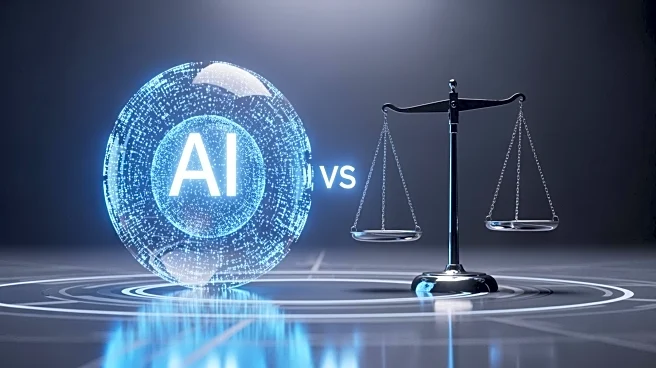What's Happening?
Anthropic, an artificial intelligence startup, is striving to compete with OpenAI, a larger rival backed by Microsoft and Nvidia. The company is also facing criticism from the U.S. government, particularly
from David Sacks, President Trump's AI and crypto czar. Sacks has accused Anthropic of supporting a regulatory approach that aligns with 'the Left's vision of AI regulation.' This criticism follows an essay by Anthropic's co-founder Jack Clark, which discussed the balance between technological optimism and fear. Anthropic, founded by siblings Dario and Daniela Amodei, was established to create safer AI, diverging from OpenAI's commercialization path. The two companies are now the most highly valued private AI firms in the U.S., with OpenAI valued at $500 billion and Anthropic at $183 billion. They differ in their regulatory stances, with OpenAI advocating for fewer restrictions and Anthropic supporting state-level regulations like California's SB 53, which mandates transparency and safety disclosures from AI companies.
Why It's Important?
The conflict between Anthropic and the U.S. government highlights the ongoing debate over AI regulation in the United States. The differing approaches of Anthropic and OpenAI reflect broader industry tensions regarding the balance between innovation and safety. Anthropic's support for state-level regulations like California's SB 53 suggests a push for more stringent oversight, which could influence future AI policy and industry standards. This regulatory landscape will impact AI companies' operations, potentially affecting their competitive strategies and market positions. Stakeholders in the AI industry, including investors, policymakers, and tech companies, are closely watching these developments, as they could shape the future of AI governance and innovation in the U.S.
What's Next?
As the debate over AI regulation continues, Anthropic and OpenAI are likely to remain at the forefront of discussions about the future of AI governance. The outcome of these regulatory battles could set precedents for how AI technologies are developed and deployed in the U.S. and globally. Policymakers may need to balance the interests of innovation with public safety concerns, potentially leading to new legislative proposals or amendments to existing laws. The tech industry and civil society groups may also engage in advocacy efforts to influence the direction of AI regulation, emphasizing the importance of transparency, accountability, and ethical considerations in AI development.
Beyond the Headlines
The regulatory debate surrounding AI also raises ethical and cultural questions about the role of technology in society. As AI systems become more integrated into daily life, issues of privacy, bias, and accountability become increasingly significant. The decisions made by companies like Anthropic and OpenAI, as well as government regulators, will have long-term implications for how AI is perceived and trusted by the public. This ongoing dialogue may also influence international discussions on AI ethics and governance, as countries around the world grapple with similar challenges.









